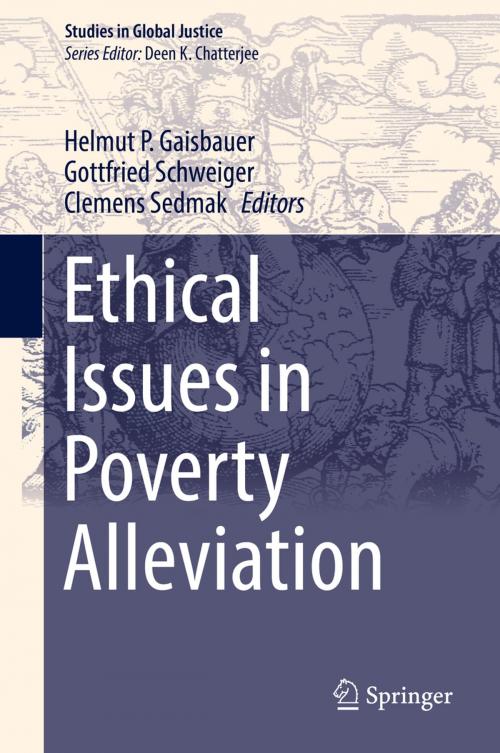Ethical Issues in Poverty Alleviation
Nonfiction, Reference & Language, Law, International, Religion & Spirituality, Philosophy, Ethics & Moral Philosophy| Author: | ISBN: | 9783319414300 | |
| Publisher: | Springer International Publishing | Publication: | September 23, 2016 |
| Imprint: | Springer | Language: | English |
| Author: | |
| ISBN: | 9783319414300 |
| Publisher: | Springer International Publishing |
| Publication: | September 23, 2016 |
| Imprint: | Springer |
| Language: | English |
This book explores the philosophical, and in particular ethical, issues concerning the conceptualization, design and implementation of poverty alleviation measures from the local to the global level. It connects these topics with the ongoing debates on social and global justice, and asks what an ethical or normative philosophical perspective can add to the economic, political, and other social science approaches that dominate the main debates on poverty alleviation. Divided into four sections, the volume examines four areas of concern: the relation between human rights and poverty alleviation, the connection between development and poverty alleviation, poverty within affluent countries, and obligations of individuals in regard to global poverty.
An impressive collection of essays by an international group of scholars on one of the most fundamental issues of our age. The authors consider crucial aspects of poverty alleviation: the role of human rights; the connection between development aid and the alleviation of poverty; how to think about poverty within affluent countries (particularly in Europe); and individual versus collective obligations to act to reduce poverty.
Judith Lichtenberg
Department of Philosophy
Georgetown University
This collection of essays is most welcome addition to the burgeoning treatments of poverty and inequality. What is most novel about this volume is its sustained and informed attention to the explicitly ethical aspects of poverty and poverty alleviation. What are the ethical merits and demerits of income poverty, multidimensional-capability poverty, and poverty as nonrecognition? How important is poverty alleviation in comparison to environmental protection and cultural preservation? Who or what should be agents responsible for reducing poverty? The editors concede that their volume is not the last word on these matters. But, these essays, eschewing value neutrality and a retreat into technical mastery, challenge us to find fresh and reasonable answers to these urgent questions.
David A. Crocker
School of Public Policy
University of Maryland
This book explores the philosophical, and in particular ethical, issues concerning the conceptualization, design and implementation of poverty alleviation measures from the local to the global level. It connects these topics with the ongoing debates on social and global justice, and asks what an ethical or normative philosophical perspective can add to the economic, political, and other social science approaches that dominate the main debates on poverty alleviation. Divided into four sections, the volume examines four areas of concern: the relation between human rights and poverty alleviation, the connection between development and poverty alleviation, poverty within affluent countries, and obligations of individuals in regard to global poverty.
An impressive collection of essays by an international group of scholars on one of the most fundamental issues of our age. The authors consider crucial aspects of poverty alleviation: the role of human rights; the connection between development aid and the alleviation of poverty; how to think about poverty within affluent countries (particularly in Europe); and individual versus collective obligations to act to reduce poverty.
Judith Lichtenberg
Department of Philosophy
Georgetown University
This collection of essays is most welcome addition to the burgeoning treatments of poverty and inequality. What is most novel about this volume is its sustained and informed attention to the explicitly ethical aspects of poverty and poverty alleviation. What are the ethical merits and demerits of income poverty, multidimensional-capability poverty, and poverty as nonrecognition? How important is poverty alleviation in comparison to environmental protection and cultural preservation? Who or what should be agents responsible for reducing poverty? The editors concede that their volume is not the last word on these matters. But, these essays, eschewing value neutrality and a retreat into technical mastery, challenge us to find fresh and reasonable answers to these urgent questions.
David A. Crocker
School of Public Policy
University of Maryland















